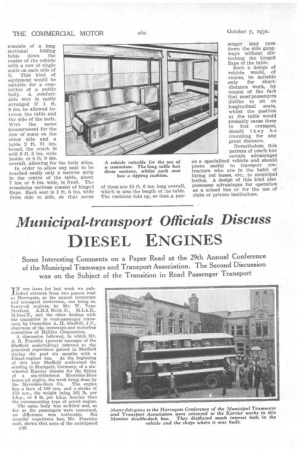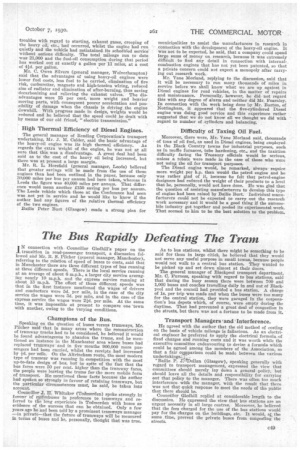Municipal-transport Officials Discuss DIESEL ENGINES
Page 70

Page 71

If you've noticed an error in this article please click here to report it so we can fix it.
Some Interesting Comments on a Paper Read at the 29th Annual Conference of the Municipal Tramways and Transport Association. The Second Discussion was on the Subject of the Transition in Road Passenger Transport
TN our issue for last week we pubilished extracts from two papers read az Harrogate, at the annual tramways and transport conference, one being on heavy-oil engines, by Mr. W. Vane M ()viand, A.M.I. Mech. E., M.Inst.T., and the other dealing with the transition in road-passenger transport, by Councillor A. H. Gledhill, J.P., chairman of the tramways and motorbus committee of Halifax Corporation.
A discussion followed, in which Mr. A. It. Fearnley (general manager of the Sheffield undertaking) referred to the practical experience gained in Sheffield during the past six months with a Diesel-engined bus. At the beginning of this year Sheffield authorized the sending to Stuttgart, Germany, of a six' wheeled Karrier chassis for the fitting of a six-cylindered Mercedes-Benz heavy-oil engine, the work being done by
the Mercedes-Benz Co. The engine has a bore of 100 mm. and a stroke of 150 mm., the weight being 16i lb. per b.h.p., or 4 lb. per blip. heavier than the corresponding type of petrol tngine.
The same body was re-fitted and, so far as the passengers were concerned, no difference was noticeable. Six months' experience has, Mr. Feartiley said, shown that none of the anticipated C48
troubles with regard to starting, exhaust gases, creeping of the heavy oil, etc. had occurred, whilst the engine had run„ quietly and the vehicle had maintained its schedfiled service without serious difficulty. The total mileage run to date WAS' 21,000 and the fuel-oil consumption during that period has worked out at exactly a gallon per II miles, at a cost of 41d per gallon.
Mr. C. Owen Silvers (general manager, Wolverhampton) said that the advantages of using heavy-oil engines were lower fuel costs, less fuel to be carried, elimination of fire risk, carburetter, magneto and high-tension wiring, reduced size of radiator and elimination of after-burning, thus saving decarbonizing and relieving the exhaust valves. The disadvantages were 25 per cent, more weight and heavier moving parts, with consequent poorer acceleration and possibility of damage when the chassis is driving the engine downhill. With progress made in design, weights would be reduced and he believed that the speed could be dealt with by means of our old friend, "electric transmission."
High Thermal 'Efficiency of Diesel Engines.
The general manager of Reading Corporation's transport undertaking, Mr. J. M. Calder, said the basic advantage of the heavy-oil engine was its high thermal efficiency. As regards the extra weight of the engine, he was not at all sure that this was a disadvantage. A great deal had been said as to the cost of the heavy oil being increased, but there was at present a large margin.
Mr. R. L. Horsfield (general manager, Leeds) believed that greater savings will be made from the use of these engines than had been outlined in the paper, because only 30,000 miles per bus per annum had been taken, whereas in Leeds the figure was 40,000 miles per annum. That difference would mean another f150 saving per bus per annum. The Leeds vehicle which those at the Conference had seen was not yet in service and he would like to know if the author had any figures of the _relative thermal efficiency of the two engines.
Bailie Peter Burt (Glasgow) made a strong plea for
municipalities to assist the manufacturers in research in connection with the development of the heavy-oil engine. It was not to be expected, he said, that a company could spend large sums of money on. research, because it was extremely diffiCult to find any detail in connection with internal-. combustion engines that has not yet been patented, so that a private concern could not expect a monopoly after carrying out research work.
Mr. Vane Morland, replying to the discussion, said that it will be necessary to run many thousands of miles in service before we shall know what we are up against in Diesel engines for road vehicles, in the matter of repairs and maintenance. Personally, however, he did not regard this with any degree of alarm and neither did Mr. Fearnley. In connection with the work being done by Mr. Barton, of Nottingham, it appeared that the five-cylindered Diesel engine was doing good service and this experience rather suggested that we do not know all we thought we did with regard to number of cylinders and balancing.
• Difficulty of Taxing Oil Fuel.
Moreover, there were, Mr. Vane Modena said, thousands of tons of oil fuel, as used in Diesel engines, being employed in the Black Country towns for industrial purposes, such as in muffle furnaces, tube hardening, etc., and the taxation difficulty facing the Treasury officials would be serious, unless a rebate were made in the case of those who were not using the oil for transport purposes.
The Diesel engine would, he remarked, always require more. weight per h.p. than would the petrol engine and he was rather glad of it, because he felt that petrol-engine designers had reduced the weight of their products to a level that he, personally, would not have done. He was glad that the question of assisting manufacturers to develop this type of engine had been raised by Bailie Burt. Individual manufacturers could not be expected to carry out the research work necessary and it would be a good thing if the automobile industry got together and pooled its experimental work. That seemed to him to be the best solution to the problem.












































































































